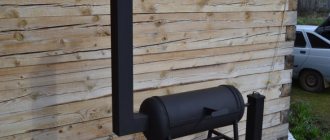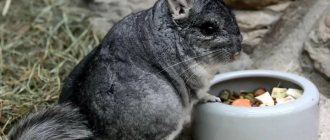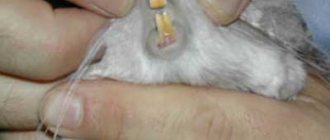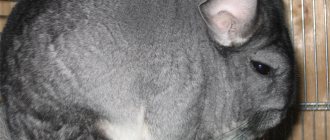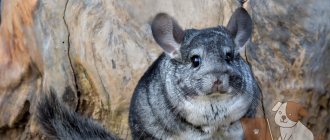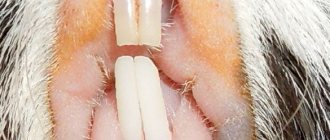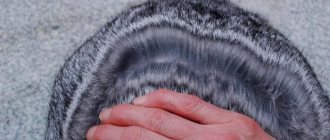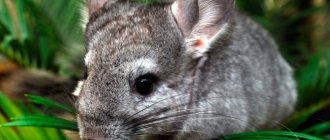Consequences and treatment of dietary disorders
One of the most common causes of diarrhea in chinchillas is various disorders associated with the animal’s feeding regimen. In this case, diarrhea can be caused by a sudden change in diet, overfeeding, the use of poor quality food to feed the pet, as well as illness of the nursing mother and the transition to feeding from mother's milk. Very often, the occurrence of poisoning in chinchillas is the result of exceeding the norm of table salt in food and the ingress of fertilizers, poisonous plants and chemicals into the food. The disease is caused by the process of exposure to toxic substances and toxins on the pet’s body, which lead to disruption of its structures and functions.
Treatment methods
There are many ways to cure a chinchilla from diarrhea. You can use medications that are sold in stationary veterinary pharmacies or use folk remedies prepared at home.
Did you know? Chinchillas have a fairly high density of fur. There are about 300 bundles per 1 cm², each of which contains 80 hairs.
Try to adjust the power system to avoid recurrence of the problem. Indigestion can be prevented by monitoring the quality of food and monitoring the condition of the animal. More details about prevention and treatment measures will be discussed below.
Medicines
The use of pharmaceutical products is relevant if traditional medicine has not produced any results. Medicines should be administered only after a doctor’s prescription, so as not to cause even greater discomfort to the animal.
It is recommended to use as pharmaceutical products:
- " Ftalazol " - 1 capsule every day;
- " Smecta ". Dilute 1 sachet of powder in 50 ml of warm water (optimum temperature +40°C). Using a syringe, feed the rodent 2 ml of the prepared liquid every day. Considering that the drug has a pleasant aroma that chinchillas liked, they will be happy to use it;
- " Bifitrilak " - 0.1 g per kilogram of animal. Recommended to be added to food;
- " Veracazole " - one tablet in the morning and evening;
- “ Hilak-forte ” - drop 3 mg of the drug into the drinking bowl every day;
- “Enterofuril” - give the rodent 0.2 ml of suspension daily;
- " Enterosgel " - at night, give 10 ml of the drug with food. Duration of treatment is at least 5 days;
- " Enterol-25 " - give your pet 1/6 of the tablet twice a day. Treatment duration is 3 days;
- " Ersefuril " - dilute a quarter of the capsule in 20 ml of water. Pour into the drinking bowl for two days.
Read also: Levels and walkthroughs of Roblox games
Folk remedies
If your chinchilla has loose stools, use folk remedies. They are lighter compared to medications, so they will not cause any harm to the pet.
Important! Carefully monitor the dosage of medications so as not to make your chinchilla feel worse. Exceeding the norm can provoke the development of other diseases or poisoning.
To relieve a rodent from diarrhea, you can do the following procedures:
- Burnet decoction (50 g of herb per 2 liters of water). Give it to the animal 2 times a day. This plant relieves inflammation, stops bleeding and has an adhesive effect.
- Rice water. Pour 500 ml of water over 1/2 cup of rice and cook for 15 minutes. Drain the liquid and give it to the rodent daily (1 cube). This decoction helps fight intoxication in the body.
- A decoction of chamomile, plantain and oak bark (20 g of each ingredient, pour 200 ml of water and boil for 40 minutes). When the product has cooled, give the animal 10 ml of decoction, injecting it using a syringe.
- Pomegranate peel , which should be given to your pet to chew on.
Constipation
With a prolonged absence of stool, constipation develops in the chinchilla, and in severe cases, coprostasis. In order not to lead to a critical condition, you need to help the rodent empty its intestines and begin treatment.
To do this, use Vaseline oil, which can be purchased at a regular pharmacy; it is safe and is not absorbed in the intestines of a rodent. During the day you should drink about 10-15 ml of oil, in small volumes every hour. The oil will help soften the stool and improve the peristalsis of the intestinal tube.
You can do a small enema with water and oil, but this procedure must be done very carefully so as not to frighten the animal. Abdominal massage can also have a positive effect on the functioning of the digestive tract.
What to do with prolonged constipation? Without wasting precious time, go to the doctor, because with multiple accumulations of feces, intoxication of the body develops and sometimes surgical intervention is required.
Medical assistance
If the diarrhea is serious and traditional methods do not help, you need to take medication.
- Phthalazole is an inexpensive antibacterial drug, sold in any pharmacy - 1 tablet. 1 per day.
- Bifitrilak - given at the rate of 0.1 grams per kilogram of animal weight. This is a veterinary drug.
- Smecta is an adsorbent, dilute 1 sachet per 50 ml of water. Give 2-3 times a day, 2-3 ml.
- Liarsin - 1 tab. 1-2 times a day
- To improve intestinal microflora, you can use the following “human” preparations of lactobacilli - Bifidumbacterin, Linex, Yogurt, Lactobacterin. Divide the contents of the capsule into 6 parts - give 1 part 3 times a day with water from a spoon.
- There is a special veterinary priobiotic - Vetom 1.1. Recommended for bacterial and viral infections such as salmonellosis, coccidiosis, dysentery, colibacillosis, hepatitis, rotavirus and paraviral enteritis. Improves intestinal function. Take according to instructions.
- Enterofuril is an intestinal antibiotic in suspension, take 0.2 ml 2 times. per day.
- Hilak-forte for normalizing intestinal microflora - 10-20 drops of the drug per 0.2 liter of water.
- Enterosgel - adsorbent 0.25 tsp. 2–3 r. in a day.
- Enterol 250 is an intestinal antibiotic. Give 1 part 2 times a day for 3 days.
- The veterinary drug for nonspecific diarrhea Pro-Kolin+ is given once a day. This feed additive contains beneficial microorganisms, kaolin, which adsorbs microorganisms and toxic substances, and pectin, a natural substance that protects the intestinal mucosa.
Disease Prevention
Prevention of diseases is carried out by strengthening their body with vitamins, long walks, a properly balanced diet, and an active lifestyle.
Some diseases of chinchillas are similar to diseases of other rodents, but there are also specific problems that are characteristic only of these animals. This must be remembered in order to properly treat chinchillas .
The most vulnerable organs and systems in the body of animals, which are most often susceptible to the development of certain diseases, are the kidneys and liver. Food containing a lot of fat (nuts, sunflower seeds, etc.) is contraindicated for chinchillas. Chinchillas are very fond of such products, but this love results in metabolic disorders, colitis, and dysbacteriosis for the animals. Males have very vulnerable kidneys. To prevent this organ from failing, make sure that the drinking water in the cage is always clean and fresh. Tap water containing excess calcium and chlorine is not suitable for rodents. Kidney disease can develop due to exposure of the animal to drafts and dampness.
High humidity provokes the development of pathogenic yeast flora in the intestines of rodents. As a result, metabolism is disrupted, dysbiosis and severe infectious diseases of the gastrointestinal tract appear. With dysbacteriosis, gases in the animal’s body begin to accumulate in the stomach and intestines, causing pain, causing convulsions, and sometimes leading to cardiac arrest.
Breeding chinchillas is an excellent business, for which to flourish it is not enough to know how to buy an animal, because you need to know about methods of disease prevention, as well as how to treat chinchillas .
Causes of gastrointestinal pathologies
Pet diseases directly depend on errors in feeding and keeping the pet. Let's look at the main reasons:
- Reduced fiber in the diet.
- Increase in the feed base of foods rich in fats and proteins.
- A large amount of dry food.
- A sudden change from one type of food to another.
- A sharp increase in succulent feed.
- Feeding moldy or stale food.
- Diet with frozen foods.
- Drinking stale water.
- Stressful conditions.
- Contact with an infected individual.
With a minimal deviation in the diet, pathology of the gastrointestinal tract can occur, which can be fatal for the pet.
With the development of a disease of the intestinal tube, the mucous membrane of the stomach, small and large intestines is affected, peristalsis is impaired and gas formation develops, and stool disturbances occur.
Loose stools
Due to improper nutrition, a chinchilla may have loose stools, which are watery, with blood or mucus. An unpleasant odor may emanate from the animal, which means that the animal has contracted an infection, picked up a bacteria or a virus.
When the animal behaves as usual - eats, plays, and is in a good mood, then you should try to help it yourself. First of all, you need to establish a strict diet: give the animal only hay and water. Also, absorbent agents should be added to food; this could be activated charcoal or the anti-diarrhea drug “Smecta”. Prepare it according to the instructions and pour it into your pet’s mouth using a pipette.
An excellent option for fixing stool would be to add a decoction of oak bark and a decoction of chamomile to the water. The raw materials are brewed with boiling water, allowed to cool, filtered and poured into the animal’s drinking bowl. Oak bark helps strengthen stool, and chamomile relieves inflammation in the intestinal mucosa. When a positive result is achieved and the stool is fixed, you can continue to give the chamomile decoction.
To normalize the intestinal microflora, lacto- and bifidobacteria are added to the animal’s food (for example, Linex, Bifitrilak). If these remedies do not help the animal, antibiotics (for example, nitrofurans, sulfonamides) are necessary. These medications should only be given as prescribed by a veterinarian. They should be applied in doses based on the weight of the animal and the disease. If your pet behaves lethargically and apathetically, or eats poorly, you must urgently show it to a specialist in order to provide the necessary assistance in a timely manner.
If loose stools are left untreated, dehydration will occur and help will also be needed. Any digestive problems are dangerous for your pet. It is better to prevent this and keep an eye on your pet. New food should be given carefully and gradually, especially fresh grass. Be sure to check the food before giving it to the animal; there should be no signs of rotting, spoilage, or mold on it. Food should be fresh, without a bad smell.
The animal’s water should always be clean and fresh, and the drinking bowl should be washed. Any nervous situation can have a negative impact on your pet: screaming, noise. The animal does not need to be frightened or made nervous.
Remember: digestive disorders are a serious problem for your animal and can be dangerous. Always provide help to your pet in a timely manner so that trouble does not happen to him. If you consult a doctor in time, you can always help your pet.
Anna Solovyova
What I am a master at is talking incessantly about hamsters. I have three hamsters at home, and my husband has a pet rat. That’s how we live, the six of us eat, the six of us sleep :)
Post Views: 1,936
Basic preventive measures
All manifestations of indigestion are very dangerous for cute pets. Therefore, special attention should be paid to prevention. It must be remembered that new feeds should be introduced gradually, with special care when feeding lush green grass.
Before feeding, inspect the food to ensure there are no traces of mold, musty odor, or unusual dust. The water must be changed daily, and the drinking bowls must be washed to remove any remaining stagnant water.
Try to protect your pet from stressful situations, sudden movements, noises, because fear can also negatively affect intestinal function.
Do not forget that pathology of the gastrointestinal tract is one of the most dangerous for rodents, and a delay in providing timely assistance can end very badly for the whole family. Competent help from a ratologist can save your pet’s life, but only if you contact it not too late.
First aid
Foul-smelling diarrhea is considered dangerous, as well as if the animal refuses water and is apathetic. In this case, you need to immediately show the chinchilla to a veterinarian, as these are life-threatening symptoms for the animal. It is possible that there is no particular reason for concern, but only a specialist can confirm this. Be sure to remember if you added anything new to your chinchilla’s diet. Inspect the chinchilla's hay and food to see if there are any parasites or fungus there. A drinking bowl with water must be disinfected, for example, doused with boiling water and soda or a chlorine-containing preparation. After this, the drinking bowl should be rinsed thoroughly and fresh, high-quality water should be poured into it. The cage should also be thoroughly cleaned, washed, and the filler changed. Keep the cage clean!
Do not delay treatment. If the boluses are not smelly, then you can completely get by with folk remedies.
Re: Soft poop
How soft? If they are just too soft, remove all excess except pellets, dry hay and water. Don't give Anfiska anything fresh anymore. This means that this food is not suitable for her (most chinchillas get diarrhea from fresh food). You don't need to do anything else.
If the feces are not formed at all, then read the topic “Diarrhea” in the disease section (it is marked as important).
About the weight. Do you know your parents' weight? If it is not huge, then 497 grams (almost 500) for a 7-month-old mouse is normal. ) It could be better, but it’s absolutely not critical.
Symptoms of diarrhea
Symptoms of indigestion in chinchillas are well expressed:
- frequent loose bowel movements;
- the animal trembles slightly - this is how fever manifests itself;
- you notice that the animal does not touch the food;
- rodent activity is reduced;
- rare urination;
- Too dry mucous membranes indicate that a chinchilla is dehydrated.
When upset, the chinchilla becomes inactive
Signs
Very often, owners confuse diarrhea with soft feces. Soft stools are when boluses are still formed. Diarrhea is a foul-smelling, dark or green liquid. In the case of just soft stool, the chinchilla is active and, except for dirt on its paws and in the cage, no changes occur in its condition. Most likely, the small animal was overfed with something or a new product was introduced into the diet.
Signs of diarrhea in a chinchilla:
- depressed state;
- frequent loose stools;
- loss of appetite;
- dehydration (rare urination, dry mucous membranes);
- fever.
Symptoms
Diarrhea is accompanied by a general deterioration in the animal’s condition and other symptoms. Poor health is reflected in the appearance of the chinchilla. The pet becomes lethargic, inactive, the fur becomes dirty, and a characteristic odor appears. There is no appetite during illness. There are up to 6-8 bowel movements per day, the stool is loose, watery, with discolored feces.
A dangerous complication of diarrhea is dehydration. A large amount of fluid is lost with loose stools, which is life-threatening for a small pet.
Symptoms
When talking about symptoms, it is important to understand the difference between soft stool and diarrhea. Soft stools are normal and just a reaction of the intestines to this or that food. It is distinguished by softer, but clearly defined feces. With diarrhea, feces turn into a dark or greenish slurry that has a pungent and unpleasant odor. More severe cases are accompanied by the presence of large amounts of mucus and bloody discharge in the stool.
The first symptoms of the disease:
- Loose and very frequent stools
- Increased body temperature
- Cramps,
- Loss of appetite,
- Apathy,
- Painful shocks and colic,
- Gas formation.
Diarrhea is almost always accompanied by severe dehydration and enlargement of the abdominal walls.
How to treat a chinchilla if diarrhea occurs due to helminthic infestation
Parasitic infection in this animal manifests itself primarily as diarrhea. According to statistics, fifty percent of all chinchillas suffer from helminthic infestation.
If you notice regular diarrhea that starts and then suddenly goes away, then this should alert you. Laboratory tests often identify parasites.
A proven remedy that will help remove worms is “Furazolidone”
. Take a tablet, divide it in half, grind it, add it to the drinking bowl at the rate of one hundred milliliters of water. The drinking bowl should be shaken periodically, as the medicine settles to the bottom and walls. Change the drinking bowl every day. If the chinchilla drinks less water, then the concentration of the medicine must be reduced.
The course lasts for one and a half weeks, which is usually enough to get rid of parasites.
In parallel with taking Furazolidone, it is effective to feed the animal with crushed Nemozol
. Per kilogram of weight/15 mg, take throughout the day, dividing this dose into three doses. This is a seven-day procedure.
Using an insulin syringe, you can accurately control the amount of medicine your chinchilla takes, as opposed to adding medicine to the drinker.
After the course of treatment has been completed, a break of ten days is taken and then repeated. To make sure that the chinchilla has gotten rid of parasites, a control test is taken after fourteen days.
Important: after eliminating worms and symptoms such as diarrhea and indigestion, the cage should be completely disinfected to prevent re-infestation.
Re: Soft poop
How soft? If they are just too soft, remove all excess except pellets, dry hay and water. Don't give Anfiska anything fresh anymore. This means that this food is not suitable for her (most chinchillas get diarrhea from fresh food). You don't need to do anything else.
If the feces are not formed at all, then read the topic “Diarrhea” in the disease section (it is marked as important).
About the weight. Do you know your parents' weight? If it is not huge, then 497 grams (almost 500) for a 7-month-old mouse is normal. ) It could be better, but it’s absolutely not critical.
Thank you very much, the poop is just a bit soft. I don't give you anything fresh. I don’t know the weight of my parents, we only recently bought Anfisa, we gave her instructions, it said that she could eat fresh, so I started giving them. She lives with my boy, but the boy’s stool seems to be normal.
Source
Other types of diseases that cause diarrhea in chinchillas
Diarrhea in a chinchilla, the treatment of which can only be clearly determined by a veterinarian, may be a symptom of invasive diseases. In this case, diarrhea may be caused by the presence of helminths and many other types of protozoa living in the animal's intestines. Just like in humans, stress in chinchillas also causes various diseases and disorders, including diarrhea. A change of environment, visits to the veterinarian and exhibitions can cause stress in animals and, as a result, short-term diarrhea. In this situation, it is enough for the owner to take care and create the most comfortable conditions for his pet.
Clinical signs of diarrhea in chinchillas include:
- presence of loose stools;
- lack of appetite;
- depressed state;
- heat;
- dehydration of the body.
The owner, first of all, is advised to understand the causes of diarrhea, and only then begin treatment. It is worth noting that diseases of chinchillas can lead to their death in a very short time, therefore, after identifying the first symptoms, you should immediately seek the help of an animal ratologist. Untimely and belated contact with a veterinarian can cause the death of your pet.
Consequences of diarrhea: dehydration, rectal prolapse, exhaustion. The critical time to call a doctor is 24 hours. Next, the chinchilla may refuse to eat and may require infusion therapy.
Download the offer in PDF Download
Flatulence
This pathological process most often develops in the spring and summer, when owners happily, but without measure, begin to feed their pets fresh, green and juicy food. From such an abundance, fermentation processes develop in the rodent’s intestines, accompanied by the release of large amounts of gas. Especially in this case, green legumes (clover, alfalfa) are dangerous.
The abdomen sharply increases in size, the pet develops severe pain, the number of respiratory movements becomes more frequent, and hypothermia may develop (temperature drops to 34 degrees).
In this case, urgently give the animal an adsorbent: activated carbon, children's espumisan in syrup or similar drugs that can be bought at a regular pharmacy. Try to increase the chinchilla's mobility, but very carefully, massage the abdominal wall.
If there is no dynamics, you need to inject an anesthetic drug and an antispasmodic, for this you need to consult a doctor. Buscopan or No-shpu are often done.
In case of flatulence, they endure a day of fasting and begin to feed hay first.
